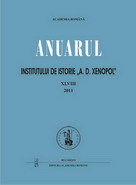Restaurarea "domniilor pământene" în Principatele Române, la 1822. Implicaţii europene (I)
RESTORATION OF “LOCAL RULES” IN THE ROMANIAN PRINCIPALITIES IN 1822. EUROPEAN IMPLICATIONS (I)
Author(s): Gh. CliveţiSubject(s): History
Published by: Editura Academiei Române
Keywords: Romanian Principalities; Tudor Vladimirescu; “Oriental crisis”; Ottoman Porte; Greeks’ national insurrection
Summary/Abstract: The circumstances of the “local princes’ ” return on Moldavia’s and Walachia’s thrones in 1822 have often been regarded as a “shadowed” outcome of the 1821 Revolution. The beginning of a new phase in the Romanians’ history was argued to be the revolution led by Tudor Vladimirescu. But there were also historians of “tradition” that ascribe the same beginning to the revolution but also to the political act of restoration of the “local rules”. On adequate document or reading basis, we tried to underline, from the perspective of the European implications, the tight correlation between the events that the Romanian Principalities crossed in 1821 and in 1822 respectively. We tried to prove that the great powers’ positions towards the agitation in the Principalities, towards the Ottoman intervention, until the “new princes” were appointed, had nothing to do with the principles or, worse, with the “system” of the Holy Alliance. The great powers, and especially Great Britain and Austria, tried to “mediate” the Russian-Ottoman dispute regarding the Principalities, but not in order to impose the Porte the acceptation of some “fair demands” from Russia. For the European diplomacy, the important thing was to impede the “dangerous” repercussions of the “Oriental crisis” on the European peace and order. The focus was on the repercussions of the agitations in the Principalities and of the Greeks’ national insurrection. The prevention of the “dangers generated in the Orient” was part of the agenda of the British-Austrian encounters at Hanover, as well as of that of the “Tatishchev missions” at Vienna. The implications of the “oriental crisis”, and particularly of the status of the Romanian Principalities, caused the failure of the attempt to organize a great diplomatic reunion at Vienna, before the Congress of Verona. Under those circumstances, the Ottoman Porte considered it to be the occasion to decide the appointment of “local princes” for the thrones of the Principalities.
Journal: Anuarul Institutului de Istorie »A.D. Xenopol« - Iaşi
- Issue Year: XLVIII/2011
- Issue No: 48
- Page Range: 131-162
- Page Count: 23
- Language: Romanian

